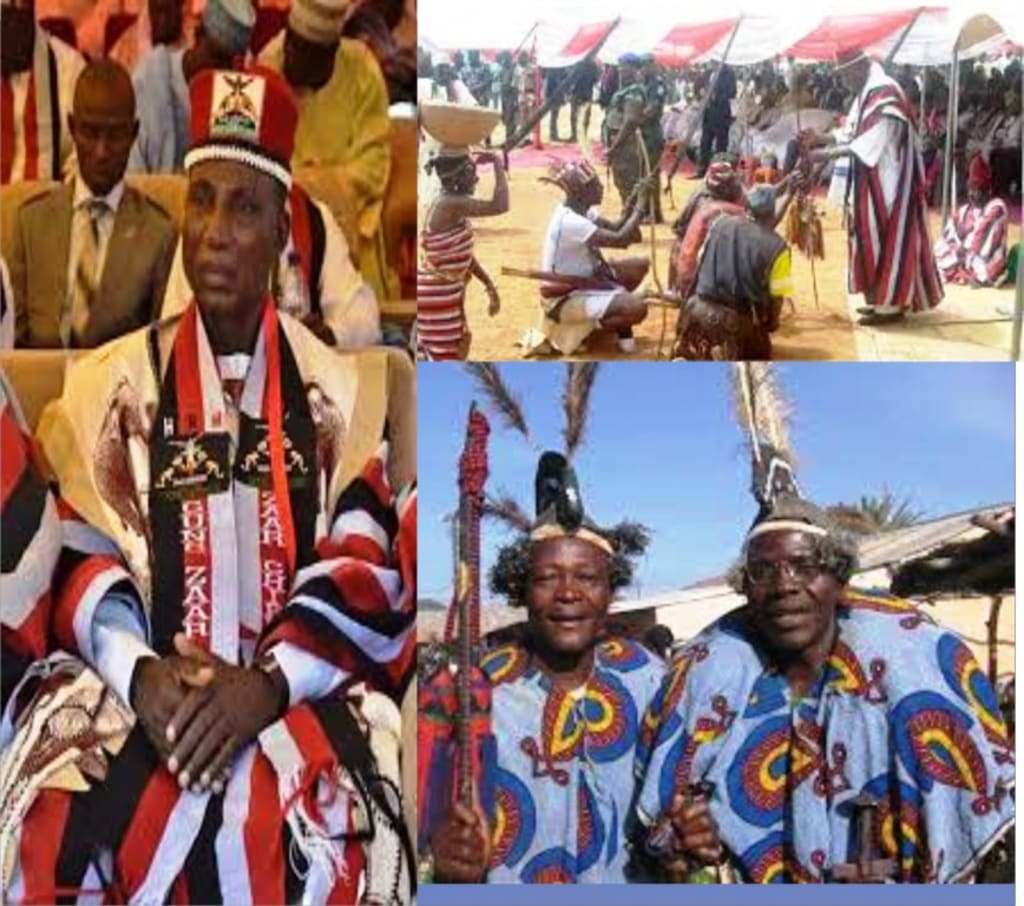ZAAR TRADITIONAL RULER
Pre-Colonial Traditional Selection Right of Zaar Traditional Ruler

Pre-Colonial Traditional Selection Right of Zaar Traditional Ruler.
During the Pre-Colonial era Zaar villages practiced the priest chief system known as the Sung Wari.
The Sung Wari was a priest who also serves as a traditional ruler over Zaar society.
Every Clan appointed its own Sung Wari who acted as Chief Priest and traditional ruler. The appointment was based upon criteria such as dedication, loyalty, hard work, bravery and acceptable moral virtues approved by elderly class.
The Sung Wari was assisted by the elderly class who served as an advisory body to govern Zaar Society. He ruled over the community on the basis of the authority of the Zaar elders.
The Sung Wari played several roles for the day to day running of the Zaar society. Prominent among the duties of Sung Wari were;
1. Demarcation of boundaries between families.
2. Settling of disputes that arose among aggrieved clans.
3. They were in charge of stranger in Zaar communities.
4. They received visitors and offered them necessary assistance.
During the Jihad after Zaar peace treaty with the Jihadist, there was a serious paradigm shift from Sung Wari political system to Sarki or Gung political system, Sarki or Gung political system was introduced by the Jihadist, Sung Wari political system was labelled as animist system, the office of Sung Wari was separated from office of Gung.
Sung Wari political system gradually eroded in Zaarland, however, it represents modest form of political administration that kept the virtue of Zaar society. It is in this way that many African Communities put in place cohesive social institutions.
In recent years, however, the phenomenon of cultural domination in northern Nigeria has swept several minority groups into the cultural stream of the Hausa. Sokoto Caliphate was conquered by British colonial forces in 1903 and the territory was divided between British, French, and German powers. While the caliphate itself was abolished, the British retained the honorary position of Sultan which continues to be recognized in contemporary Nigeria as an influential religious and spiritual leader. Colonial Chieftaincy Ordinance was promulgated by the British to give them power for the appointment and deposition of Chiefs in Northern Nigeria.
The Sokoto Caliphate and all the Emirs under it Territory lost their powers as Traditional Rulers to the colonial masters. The colonial masters were able to re-employ them as Civil Servant under the British Government not as Traditional Rulers to assist them with the following functions; 1. Heads of native authorities at the local level, 2. They performed judicial functions, 3. Custodians of revenue at the local level, 4. Participants in national political institutions, 5. They served as a link between the local people and the colonial government.
After Nigerian independence from the British empire in 1960, Sir Ahmadu Bello the first and last Premier of Northern Nigeria did what the British Colonial Master did by retaining the position of Sultan, retaining some of the British Chieftaincy Law that favour him with Sokoto Caliphate, amend those not favourable to him respectively.
Ideally, from Nigerian independence in 1960 , if a Local Government emerge in Nigeria, it emerge with a traditional institution in line with the Customs, Culture, traditions of the Area, because Traditional Rulers are the custodian of customs, culture and traditions of their people. I don't know why that of Zaarland is different. The current traditional selection right of Gung Zaar that Governor Bala Mohammed is trying to impose on our people is not in accordance with our customs, culture and traditions. Zaarland didn't need a Civil servant, but a traditional ruler in line with our customs, culture and traditions.
About the Creator
Jordan Lawi Hassan
An Information Technology Professional as well as Business Administrator. In practical field am into Data processing, Data Entry, Graphics and Designs, online editting, Multimedia, Video and Audio editting among others.






Comments
There are no comments for this story
Be the first to respond and start the conversation.